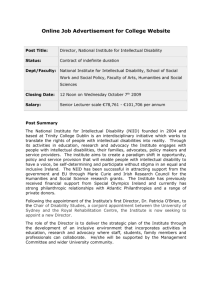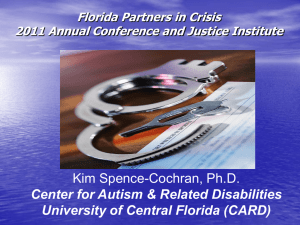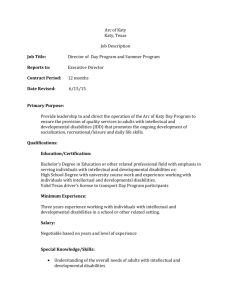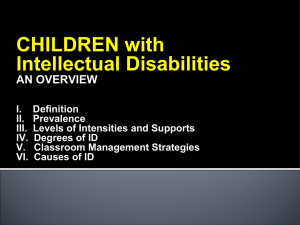Post Specification
advertisement
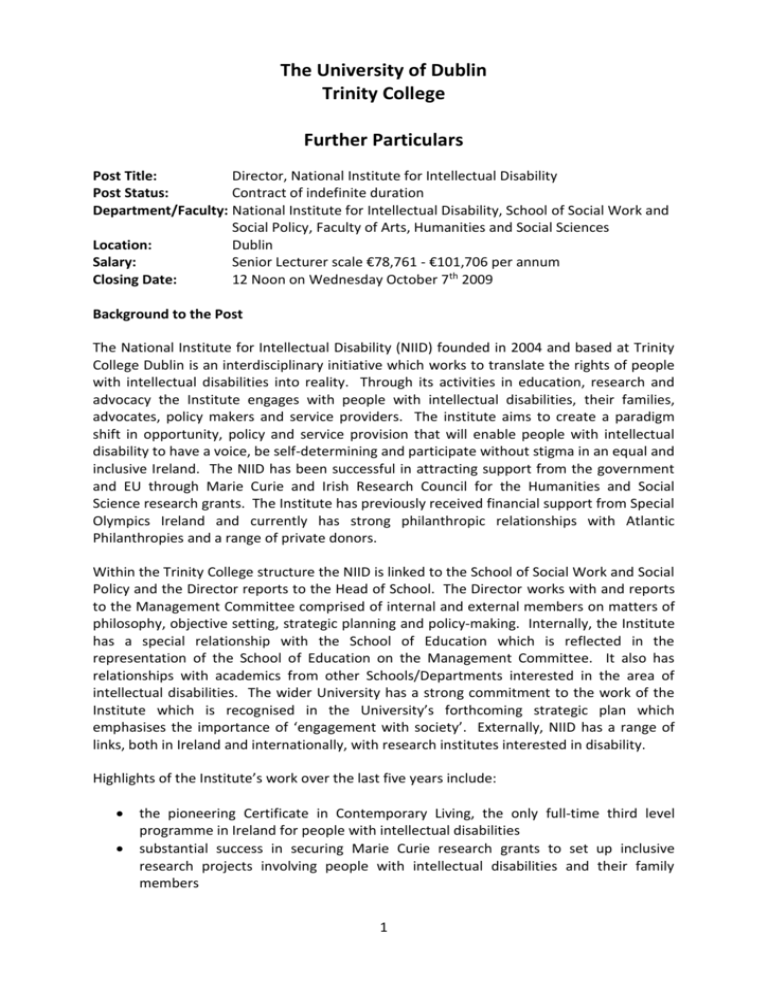
The University of Dublin Trinity College Further Particulars Post Title: Director, National Institute for Intellectual Disability Post Status: Contract of indefinite duration Department/Faculty: National Institute for Intellectual Disability, School of Social Work and Social Policy, Faculty of Arts, Humanities and Social Sciences Location: Dublin Salary: Senior Lecturer scale €78,761 - €101,706 per annum Closing Date: 12 Noon on Wednesday October 7th 2009 Background to the Post The National Institute for Intellectual Disability (NIID) founded in 2004 and based at Trinity College Dublin is an interdisciplinary initiative which works to translate the rights of people with intellectual disabilities into reality. Through its activities in education, research and advocacy the Institute engages with people with intellectual disabilities, their families, advocates, policy makers and service providers. The institute aims to create a paradigm shift in opportunity, policy and service provision that will enable people with intellectual disability to have a voice, be self-determining and participate without stigma in an equal and inclusive Ireland. The NIID has been successful in attracting support from the government and EU through Marie Curie and Irish Research Council for the Humanities and Social Science research grants. The Institute has previously received financial support from Special Olympics Ireland and currently has strong philanthropic relationships with Atlantic Philanthropies and a range of private donors. Within the Trinity College structure the NIID is linked to the School of Social Work and Social Policy and the Director reports to the Head of School. The Director works with and reports to the Management Committee comprised of internal and external members on matters of philosophy, objective setting, strategic planning and policy-making. Internally, the Institute has a special relationship with the School of Education which is reflected in the representation of the School of Education on the Management Committee. It also has relationships with academics from other Schools/Departments interested in the area of intellectual disabilities. The wider University has a strong commitment to the work of the Institute which is recognised in the University’s forthcoming strategic plan which emphasises the importance of ‘engagement with society’. Externally, NIID has a range of links, both in Ireland and internationally, with research institutes interested in disability. Highlights of the Institute’s work over the last five years include: the pioneering Certificate in Contemporary Living, the only full-time third level programme in Ireland for people with intellectual disabilities substantial success in securing Marie Curie research grants to set up inclusive research projects involving people with intellectual disabilities and their family members 1 the Irish Research Council for Humanities and Social Science funded electronic archive of the life stories of people with intellectual disabilities – ‘A Story to Tell’ http://www.tcd.ie/niid/life-stories/ 2009 Summer School which brought together people with intellectual disabilities, family members, professionals and international experts in an inclusive environment on the Trinity College campus The new Director will maintain the ethos of the NIID and lead the next phase of the Institute’s evolution by developing work in the key activities of education, research and advocacy. Post Specification Working Relationships Within the Trinity College structure the Institute is linked to the School of Social Work and Social Policy. The Director reports to the Head of School. The philosophy, identification and refinement of objectives, strategic planning, policy-making and assistance with fundraising is undertaken by the Management Committee of the Institute consisting of both internal College and external members. The Director will be expected to work with and report to the Management Committee on these matters at regular, scheduled meetings. The Institute has a special relationship with the School of Education which is reflected in the representation of the School of Education on the Management Committee. It also has relationships with academics from other Schools/Departments interested in the area of intellectual disabilities such as School of Nursing and Midwifery, Department of Clinical Speech and Language Studies and Department of Occupational Therapy. The Director will also liaise regularly with staff in the service functions of the university such as the Trinity Foundation, Treasurer’s Office and Staff Office. Standard Duties of the Post The role of the Director is to realise the vision of the Institute through the development of an inclusive environment that incorporates activities in education, research and advocacy where staff, students, family members and professionals can collaborate to deliver the strategic plan of the Institute and contribute to the strategic objectives of the University. The Director will manage the Institute’s portfolio of work leading a team to perform the following duties; Education To develop and enhance the existing Certificate in Contemporary Living programme which was initiated at Trinity and is now being rolled out nationally in collaboration with other third level institutions http://www.tcd.ie/niid/lifelong/certificate/ To continue the development of new post graduate and professional development programme initiatives such as the Diploma in Early Intervention, Masters in Disability Studies and Structured PhD by working closely with key College staff, service agencies, professional associations and employers To promote the concept of lifelong learning for people with intellectual disabilities and identify further learning opportunities 2 Research To drive the institute forward through internal, national and international collaborations on research proposals and budgets to secure research funding To act as a principal investigator on research projects, support other principal investigators and supervise Masters and PhD students To publish and disseminate research findings Advocacy To create awareness of the rights and needs of people with intellectual disabilities and enable people with intellectual disabilities to influence appropriate policy developments that impact on their lives. This may involve organising conferences, seminars, public lectures, workshops, discussion groups and creating a neutral space to explore new ideas To promote the inclusion of people with intellectual difficulties in all areas of Irish society and ensure the involvement of people with intellectual difficulties, their families and service providers in all aspects of the work of the Institute To foster links inside and outside Ireland with a range of organisations including educational and research institutions, advocacy networks, parent organisations, representative bodies and major NGOs e.g. Special Olympics Strategic planning and funding To work on the next cycle of strategic planning for NIID in collaboration with the Management Committee and Head of School To work with and report to the Management Committee and Head of School to implement the strategic plan and develop the long term policies of the institute To seek and develop income generating activities and appropriate fund raising to support the aims of the institute in collaboration with the Trinity Foundation Management To manage and control the Institute’s budget in accordance with the policy of the Management Committee and Head of School and provide accurate financial records on a regular basis to the Management Committee and Head of School. To act as a mentor and coach for Institute staff, students and volunteers To lead the individual, team and organisational development of the staff and the institute Funding Information The post is advertised as a contract of indefinite duration with part funding by Atlantic Philanthropies. The post will require matched funding through the Institute’s activities in education, research and advocacy. 3 Person Specification Qualifications The Director will possess a PhD and related publications in the field of intellectual disabilities or related fields. Knowledge & Experience The Director will have experience of: Essential education, research and advocacy in multiple contexts directly dealing with people with intellectual disabilities and their families contact with service agencies and governmental departments responsible for intellectual disability the Irish, European and International education and research landscape raising finance from a range of sources - commercial, governmental and philanthropic line management including staff management financial budgeting and management writing academic books and articles leading research teams and implementing research projects Desirable academic programme development direction of events programmes social entrepreneurship The Director will have knowledge of: Essential a broad array of disability policy issues (employment, care, accommodation, education, recreation, community living) inclusive research practice and policy inclusive education practice and policy models of best practice in the lifelong learning of people with intellectual disability human rights and advocacy Desirable supported and independent employment and living opportunities relevant Irish, European and International legislation, strategies and policies affecting people with intellectual disabilities Skills & Competencies The Director will have: the capacity to inspire, lead and develop people the ability to network with and influence others an ability to model the values of inclusion an accessible and approachable demeanour excellent interpersonal, communications and facilitation skills excellent organisational and management skills and the ability to prioritise and direct a complex and changing workload excellent writing skills both academic and report/proposal writing 4
